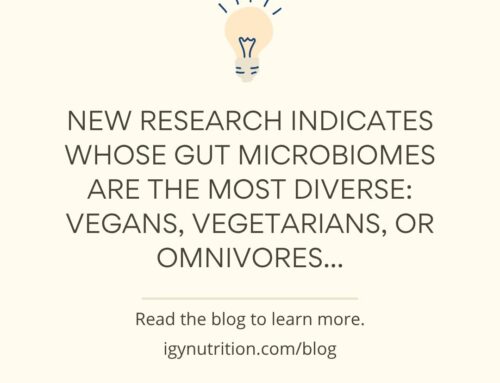If you’re struggling to get your gut microbiome imbalance under control, you might’ve been thinking about getting your hands on some IgY antibodies – but perhaps you’re unsure if they’ll actually work.
Today, we’ll take a look an IgY dysbiosis study on IgY Max. Participants took IgY Max for 8 weeks. Their levels of beneficial flora, gut barrier integrity, and inflammation markers were measured before and after. Let’s take a look at the results!
Recap: Why Take IgY Antibodies for Gut Dysbiosis?
You might already know a bit of microbiome science, but here’s a quick recap.
The microbiome is an ecosystem of millions of microbes – like bacteria, yeasts, and even fungi – living within or on the human body. The term “gut microbiome” refers to the microbes inhabiting the GI tract.
At first glance, microbes living in the body might sound pretty gross – but it turns out they’re critical to our health. Many microorganisms living within us benefit our bodies by regulating our metabolism, helping us absorb vitamins from food, supporting our immune system, and much more (Source).
The thing is, not all of the microorganisms in our microbiomes are helpful. Some are harmful. These harmful microbes can damage the gut barrier, increase inflammation, and wreak havoc on our metabolisms, hormone production, immune systems, and mental health (Source). Plus, they can cause uncomfortable digestive issues like gas, bloating, and stool irregularity – no fun.
To minimize the gut damage and annoying symptoms the harmful microbes cause and maximize the benefits helpful microbes confer, we want many beneficial microbes and very few harmful microbes to live in our guts. There are typically too many harmful microbes and not enough helpful microbes in an unhealthy microbiome. This state of imbalance is called dysbiosis (Source). Check out our blog titled “Is My Microbiome Imbalanced” to learn more about dysbiosis.
To overcome dysbiosis, you’ll want to:
- Reduce harmful pathogens living in your gut microbiome
- Support the helpful microbes already living in your gut microbiome
- Increase populations of helpful microbes living in your gut microbiome
Getting Rid of the Bad Guys: Antibiotics?
Traditional treatment for dysbiosis typically involves antibiotics to clear the “bad” bacteria. The goal is to get rid of the harmful bacteria that cause symptoms.
Antibiotics are the first-line treatment for dysbiosis, but they are often ineffective. Studies have shown that antibiotics only work in about 50% of SIBO-related dysbiosis cases (Source).
That may be because antibiotics kill both good and bad bacteria, leading to an imbalance in gut flora. As a result, other treatment options, such as probiotics or herbals, may be more effective in treating dysbiosis.
Getting Rid of the Bad Guys: Herbal Therapies?
Probiotics and other natural therapies, such as herbs, may be as or more effective in restoring the balance of gut bacteria and treating dysbiosis, but there are a few caveats (1).
They may be less risky, but some studies show they are less effective than antibiotics. They are also prohibitively expensive for many patients. More research is needed to evaluate their level of efficacy.
Many scientists argue that one of the main reasons dysbiosis is so challenging to treat is that a variety of different bacteria can cause it. Perhaps herbal treatments work well for one strain but not another.
It seems that there aren’t many great options – or are there?
So, what are IgY antibodies, and what do they have to do with dysbiosis?
What are IgY Antibodies?
Antibodies are components of animals’ immune systems that bind to and help to neutralize invaders.
For example, after getting a COVID-19 vaccine, humans develop antibodies specialized to neutralize COVID-19. That way, the next time they are exposed to the virus, their immune system can defend the body from it more easily.
IgY antibodies are a specific type of antibody that can be used to help neutralize specific pathogens living in the human gut. But what exactly are they? Hang in there with us through a short bit of science to find out how IgY antibodies are made:
IgY technology harnesses natural passive immunity processes to develop antibodies for human use. Passive immunity is the transfer of antibodies from one organism to another. This transfer occurs naturally in mammals through breastfeeding. Avian organisms such as chickens transmit antibodies to their young through the yolks of their eggs.
This transfer fortifies the offspring’s immune systems with already responsive antibodies, which the mother has developed in response to her prior exposure to pathogens.
For example, if a mother chicken gets sick with the avian flu, she will develop antibodies to it and pass them on to her offspring through the yolks of her eggs.
Scientists can incorporate naturally-made antibodies of their choosing into medications or supplements by vaccinating mother hens with pathogens of choice. These antibodies can be used to neutralize pathogens in humans. Chicken antibodies, called IgY, work just as well in humans as in chickens.
After allowing the hens time to produce and transmit antibodies in their yolks, scientists extract them from the eggs. After this extraction procedure, the antibodies are ready for use as a medication or supplement. The only ingredient is, well, egg yolk (without the shell)!
Doctors have been enhancing immune responses through artificial passive immunity for decades. IgY antibodies are used in antivenom medications, diagnostic procedures, pediatric norovirus medication, and more. These antibodies have been studied for their use in other applications, such as HIV-induced cachexia, cystic fibrosis, and fibromyalgia.
IgY Antibodies for Dysbiosis
Scientists at IgY Nutrition realized that IgY antibodies could be used to address dysbiosis by neutralizing well-known bad actors in gut microbiomes. o, they created IgY Max.
IgY Max is a specifically immunized egg-based supplement containing antigen-specific antibodies that target and neutralize 29 dysbiotic pathogens commonly found in the human gut microbiome, including Klebsiella pneumoniae, Salmonella, various strains of Staphylococcus and Streptococcus, and more.
In non-science speak: IgY Max is a supplement (made of only egg yolk) containing antibodies that neutralize pathogens living in the gut. These pathogens could contribute to your digestive symptoms if you have them.
Upon consumption, IgY Max antibodies exert their anti-pathogenic activity throughout the entire length of the gastrointestinal tract. They have a high pathogen-antibody affinity, inhibiting bacterial adhesion, suppressing colonization, and neutralizing each targeted pathogen thoroughly. eutralized pathogens are expelled from the gut through the stool (your poop!).
The product’s neutralization of pathogens allows beneficial microbes to flourish, which may help to restore microbial diversity to the microbiome and rebalance it. This positive shift in microbiome composition reduces dysbiotic pathogens’ initiation of gastrointestinal damage and amplifies healthy flora’s conferral of gastrointestinal benefits.
So, does it actually work? Let’s take a look!
IgY Dysbiosis Study Results
A university-led study of IgY Max measured participants’ beneficial flora, gut barrier integrity, and inflammation marker levels before and after consuming IgY Max for eight weeks.
The study found that IgY Max consumers’ beneficial flora, gut barrier integrity, and inflammation levels improved significantly over eight weeks of use. More specifically, participants’ levels of inflammatory cytokines, high-sensitivity C-reactive protein, helpful bacteria counts in the stool, zonulin, histamine, and diamine oxidase improved substantially. What are these?
Zonulin is a regulator of intestinal permeability and can therefore be a biomarker of impaired gut barrier function. Histamine, produced by mucosal mast cells, acts as a proinflammatory mediator in the intestine and modulates intestinal permeability. AO, diamine oxidase, is the enzyme made by microvilli that degrades histamine. Low levels of DAO and elevated levels of histamine have been implicated in chronic inflammatory and autoimmune disorders.
Improvement of these markers is associated with improved GI function, intestinal wall integrity, and levels of inflammation. The study found that “IgY 26, given to subjects, resulted in improvement of markers of gut distress such as Zonulin, DAO, and Histamine… beneficial flora including Bacteroides fragilis, Bifidobacterium species, E. coli, Lactobacillus, Enterococcus, Clostridium were tracked. Then the quantitative value of the flora was summed; there was an increase overall.”
Perhaps most importantly, participants’ symptoms improved upon use. Consumers report a decrease in symptoms of dysbiosis following consistent consumption, including:
- improved stool regularity and composition
- decreased bloating and gas
- higher energy levels
Though unofficial, the abundance of positive Amazon reviews describing users’ alleviation of symptoms is a telling indicator of IgY Max®’s power to benefit consumers.
Have you tried IgY Max for your digestive symptoms? Let us know in the comments on Instagram @igynutrition. Thank you for reading our IgY dysbiosis study. See you next time!




